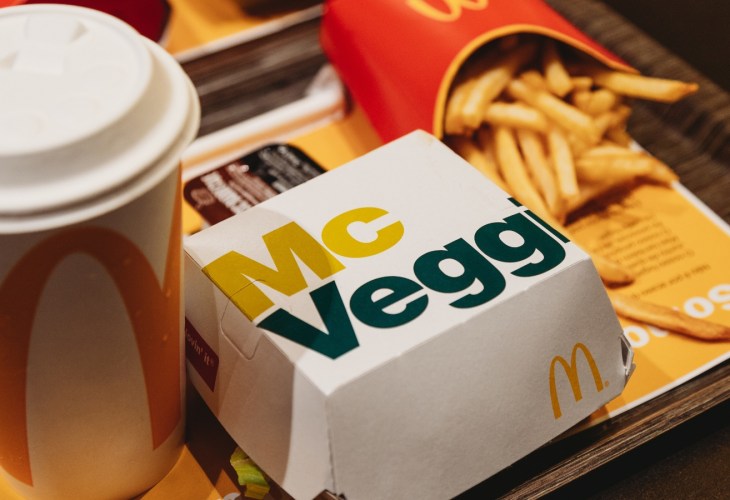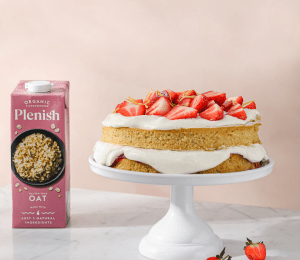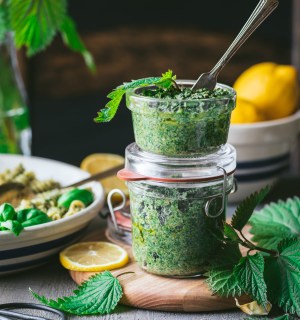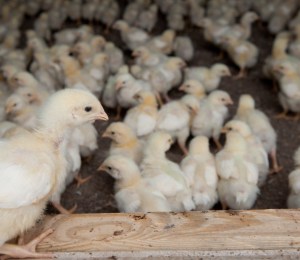Greggs, McDonald’s, Pizza Hut, KFC, Nando’s, Subway, and Burger King are some of the most popular fast-food chains in the UK. And, without exception, all of them now offer vegan options.
And we’re not just talking about a bean patty stuffed in a bun with some limp lettuce.
Not in 2022. These chains are offering vegan beef burgers, chicken, pepperoni, and more. And people should get used to it, says leading restaurateur James Lewis, because vegan fast food is the future.
Lewis made the comments in reference to Burger King’s Leicester Square location in London, which recently made its menu 100 percent vegan for one month. The idea was to find out just how popular meat-free fast food is, and to assess which of its new vegan options were most popular with consumers.
Per the Guardian, Lewis, who runs two successful vegan restaurants in London alongside Michelin-starred chef Alexis Gauthier, believes it’s only a matter of time before fast food menus all over the country are totally vegan.
The UK’s vegan fast food scene
He said: “Fast food is 100 percent the best area to switch to vegan. The chains are often sneered at by people but they are setting the trends here.”
“There’s no point starting a vegan chain because once McDonald’s figures out how to make a good vegan burger, they will think: ‘What’s the point in the cost of keeping all these animals when we can make it just as good and grow it in the ground?’” he added.
At first, Lewis’ prediction seems extreme. But McDonald’s has already hinted that following the success of its McPlant burger, more vegan options could be on the horizon.
Amid the launch of its first-ever net-zero location in Shropshire, McDonald’s spokesperson Beth Hart said: “I can’t speculate on what the McDonald’s menu will look like in the future, but I think it will look very different. We might see more plant-based items on the menu. It’s not so much about influencing choice but offering alternatives.”
Along a similar vein, back in 2019, Greggs CEO Roger Whiteside revealed the chain was working on plant-based versions of all of its bestsellers, after the successful launch of its vegan sausage roll.
Since then, Greggs has launched vegan steak bakes, chicken, sausage sandwiches, ham and cheese baguettes, and sausage, bean, and cheese melts.
“Not too long from now, people will be getting their burger and it’ll be a vegan one and that’ll be the norm and they won’t think any different,” said Lewis.














Leave a Comment
Plant Based News Comment Policy
In short:- If you act with maturity and consideration for other users, you should have no problems. Please read our Comment policy before commenting.
I’d like to see the future of fast food to be healthy and wholesome. Currently, it seems that we are trying to pump as many chemicals as possible into it, in addition with plant oils that are a lot more unhealthy than saturated animal fats. Replacing unhealthy stuff with other unhealthy stuff isn’t really a win for anybody.
Hi Holger, thanks for your comment. Sometimes people desire greasy fast food, whether they eat animals or not. It’s good to have an alternative that doesn’t harm animals and is familiar for people, but no one eats it thinking its a health food. Also worth noting in terms of the health of plant oils: In a recent cohort following 521,120 people looking at cooking oil/fat consumption and cardiometabolic disease, after adjusting for confounders, they found that each 1tbsp increase in butter intake (saturated animal fat) was associated with a 7% higher risk of total mortality, while each 1 tbsp of canola oil was associated with a 2% drop in risk, and olive oil was associated with a 3% drop. Part of the study included a substitution analysis, where researchers found that replacing 1tbsp of butter with any plant-based oil reduced risk of total mortality. Polyunsaturated and plant monounsaturated fats are health promoting, while saturated and trans fats are typically detrimental. Hope that clarifies things. https://pubmed.ncbi.nlm.nih.gov/33853582/
Thank you for your answer and for posting the study. While the results are interesting, unfortunately they won’t translate into the real world. I work in that field and can tell you that it’s impossible to use the magic of statistics to “replace” a teaspoon of butter with a teaspoon of a different oil. The reason is that the confounders are simply too great. As such, more butter usually also comes with other aspects that affect the overall context of health, which can’t be reflected by statistics, because the statistics can never represent the complicated context of human health. Secondly, food frequency questionnaires are notoriously unreliable. The data at this point is certainly interesting, but unfortunately it doesn’t add up to much more than a gimmick. I would be very interested in a long-term study with healthy people on a low carb diet and a vegan diet, maybe with sports performance thrown into it.
Hi Holger,
The point was you said that plant oils are worse than saturated animal fats- that study, among others, proves what we already know, plant oils are far better than saturated animal fats. You can absolutely swap out the butter in your diet for plant oils. I’m sure the scientists would disagree that it is a gimmick. https://pubmed.ncbi.nlm.nih.gov/35307047/
That is incorrect. Sunflower oil, for example, contains excessive amounts of inflammatory omega-6-fatty acids. In regards to fast food, which is what we were talking about, industrial plant fats also contain trans fats, which are proven to be unhealthy. And again, just posting one study doesn’t make your claim true. Your last one is about plant based diets no less. Completely besides the point.
Thanks for your comment Holger,
Studies actually show that inflammatory markers are not increased when someone eats a food rich in Omega-6s. (https://academic.oup.com/jcem/article/104/12/6207/5540968) There are plenty of plant oils rich in Omega-3s, and free of trans fats. Saturated animal fats are significantly worse in every aspect.